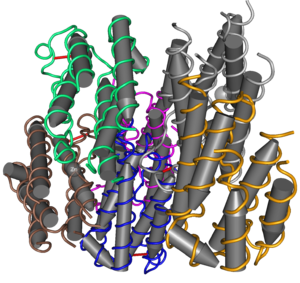Interferon facts for kids
Interferons (say: IN-ter-FEER-ons), often called IFNs, are special proteins made by your body's cells. They are released when your cells are attacked by tiny invaders like viruses, bacteria, or parasites. They also help fight against tumor cells (which can cause cancer).
Think of interferons as your body's alarm system. They tell your immune system to get ready and fight off these harmful invaders. Interferons are part of a bigger group of proteins called cytokines. They got their name because they "interfere" with how viruses make copies of themselves inside your cells. This stops the viruses from spreading.
How Interferons Help Your Body
Interferons do many important jobs to keep you healthy:
- They turn on special immune cells, like natural killer cells and macrophages. These cells are like soldiers that find and destroy infected or unhealthy cells.
- They help your immune system recognize infected or tumor cells better. They do this by showing parts of the invaders (called antigens) to other immune cells, like T lymphocytes. This helps your body target the bad cells more accurately.
- They make it harder for viruses to infect healthy cells. This means if one cell is infected, interferons can protect the cells around it from getting sick too.
When your body makes interferons to fight an infection, you might feel some symptoms. Things like aching muscles or a fever are often signs that your interferons are working hard!
Types of Interferons
Scientists have found about ten different types of interferons in mammals (like humans, dogs, and cats). For humans, seven of these types have been studied. All interferons are super important for fighting off viral infections and keeping us well.
Images for kids
-
Sidney Pestka of Rutgers University, receiving the National Medal of Technology for his work with interferons.
See also
 In Spanish: Interferón para niños
In Spanish: Interferón para niños
 | Chris Smalls |
 | Fred Hampton |
 | Ralph Abernathy |




